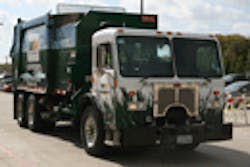Waste Management field-testing hydraulic hybrids
Waste Management, Inc. announced it has begun field-testing four parallel hydraulic hybrid-diesel collection trucks in its Fort Worth fleet to study the hybrid system’s efficiency and reliability. According to the company, the vehicles will be the first hydraulic hybrids to be deployed in a waste collection vehicle.
Waste Management will equip four Peterbilt 320 vehicles with a Hydraulic Launch Assist (HLA) system developed by Eaton Corp. designed to capture and store energy during braking. HLA improves efficiency and reduces wear on brake pads by transferring the stored energy to accelerate the vehicle to the next pickup location, the company said.
“We are working closely with a number of manufacturers to develop and test both hydraulic and electric hybrid systems for our fleet vehicles,” said Eric Woods, vp of fleet and logistics for Waste Management. “The challenge for our engineering team is to make our vehicles as efficient as possible while also ensuring they are tough enough to withstand wear and tear on the road. Though development is in early stages, we are optimistic that the investment we are making now will lead to a reduction in greenhouse gases and ultimately benefit both manufacturers and users of heavy vocational vehicles.”
According to the company, the development of hybrid technologies in Class 8 vocational vehicles poses additional challenges, as they require both a drivetrain that can handle heavy loads as well as multiple systems for compaction and lifting.
“We look forward to partnering with Waste Management as they take this important next step in field testing,” said Ruppert Russoniello, vp & gm of Eaton’s hydraulics business. “Waste collection vehicles present a huge opportunity for the environmental benefits created by Eaton’s hydraulic hybrid technology.”
The field tests are part of the company’s sustainability initiative, announced last year. Waste Management said it hopes to increase the fuel efficiency of its fleet by 15% and reduce emissions by 15% by 2020.
According to the company, Waste Management is working towards making its routes and fleets more efficient, using compressed natural gas (CNG) and liquefied natural gas (LNG) as alternative fuels for its fleet. The company also plans to double waste-based energy production and increase the volume of recyclable materials it manages from 8 million tons to 20 million tons by 2020.
The company added that it will continue to evaluate a number of different technologies that could create fuel for vehicles from landfill gas, including LNG and synthetic diesel.
Waste Management, based in Houston, has annual fleet expenditures of up to $500 million. The company provides collection, transfer, recycling and resource recovery, and disposal services through its subsidiaries.
